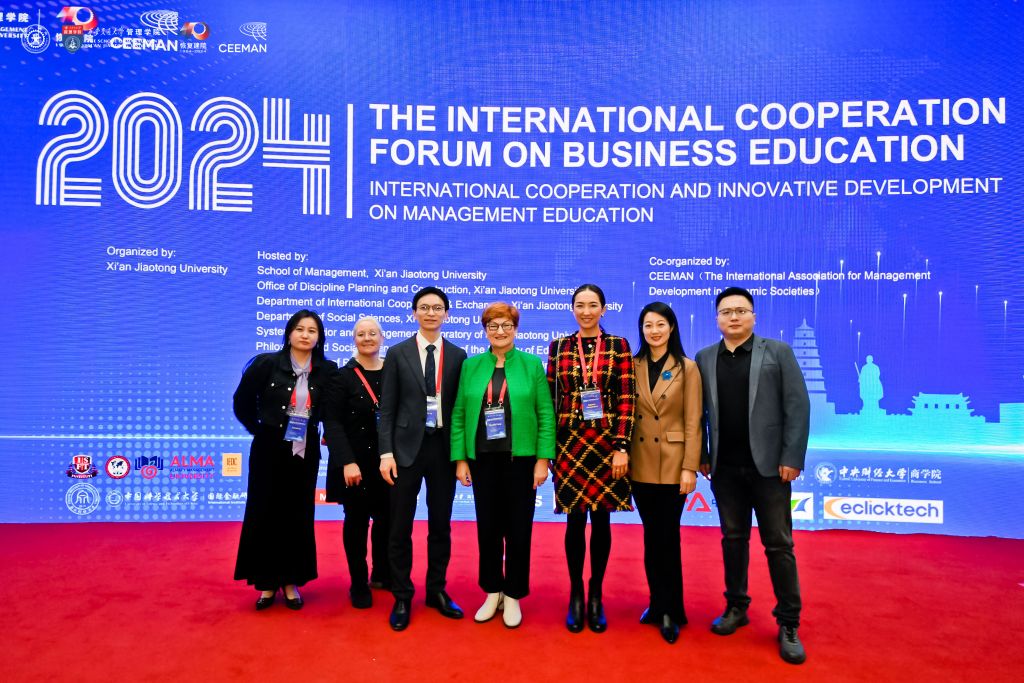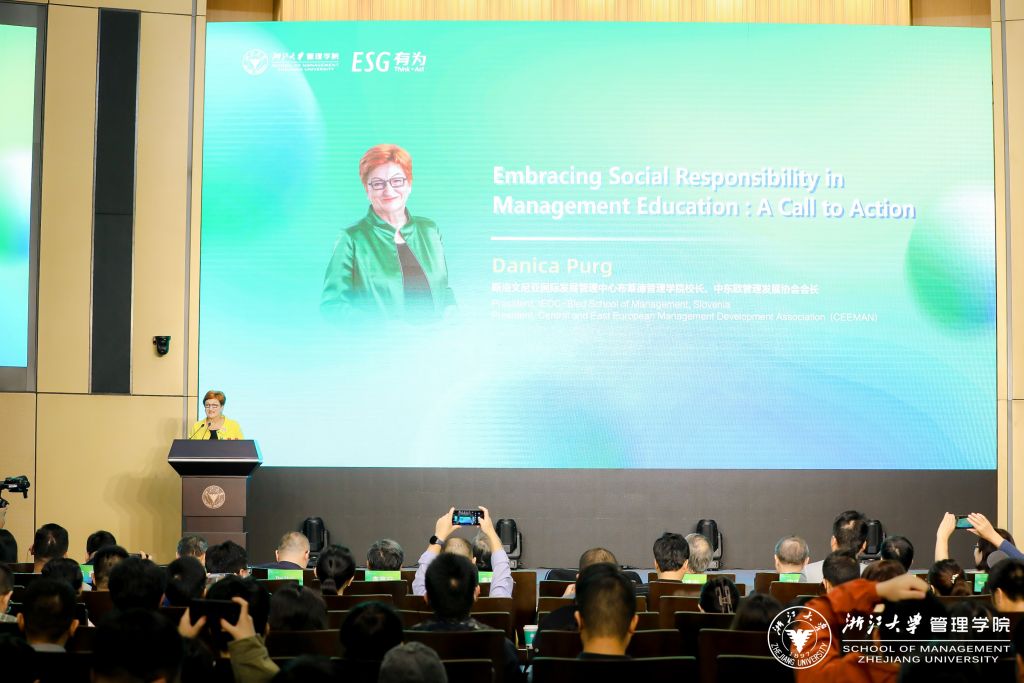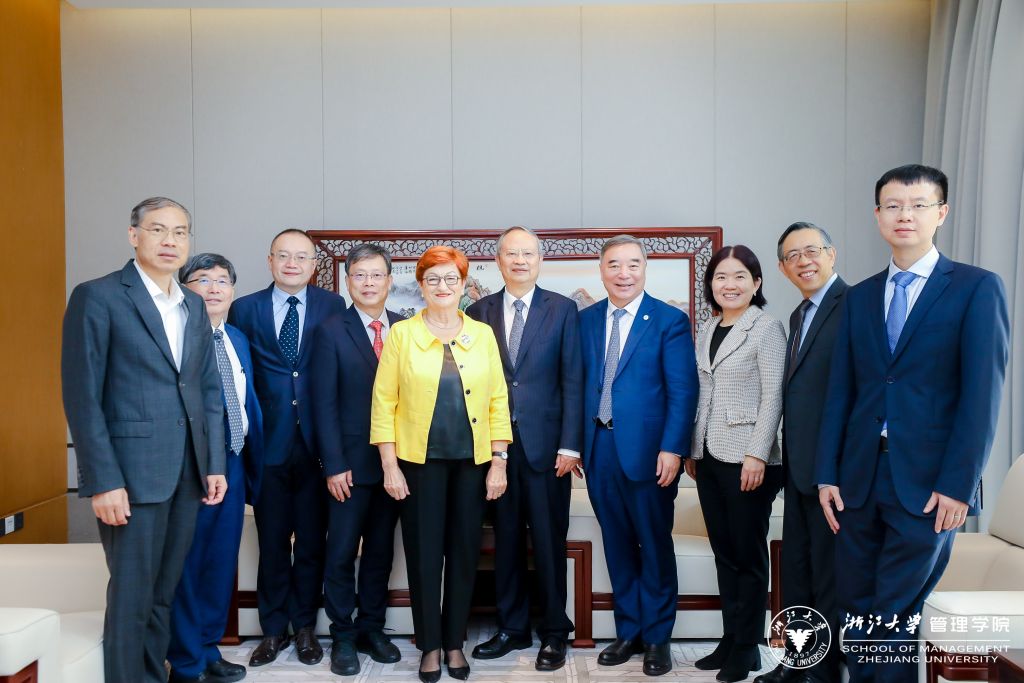Building Bridges Between Slovenia and China

The Future Holds Great Potential for Collaboration Between China and the CEE Region
Prof. Danica Purg
Founder and the Dean of the IEDC – Bled School of Management
Danica Prug
Founder and the Dean of the IEDC – Bled School of Management
Professor Danica Purg is the Founder and Dean of IEDC-Bled School of Management, Slovenia, and the President of CEEMAN, the International Association for Management Development in Dynamic Societies, which brings together 200 management development institutions from 50 countries.
Prof. Purg is professor of leadership and effective management at IEDC-Bled School of Management. She has been an innovator in management education, incorporating the arts and artistic processes into management education and building an ethics component into the curriculum of all longer management programs at IEDC since its inception.
She is a frequent guest speaker at universities around the world and at international conferences. Prof. Purg has authored and co-authored several books and numerous articles on leadership and leadership development issues.
In 2021, Springer published an update of the Hidden Champions research titled Hidden Champions in Dynamically Changing Societies: Critical Success Factors for Market Leadership, with Prof. Purg being the co-editor and co-author.
In 2018, Springer published the book Business and Society: Making Management Education Relevant for the 21st Century, which was co-edited by Prof. Purg.
The article “Why art in management education? Questioning meaning”, written together with colleague Ian Sutherland and published in 2017 by the Academy of Management Review is very often quoted in management literature worldwide.
In 2015, a special chapter about her leadership journey was published in the book Women and Leadership Around the World by Information Age Publishing, USA, authored by Susan Madsen.
Prof. Purg has received numerous national and international awards for her outstanding achievements in the field of international business education. The President of the Republic of Slovenia awarded her with the Honorary Order of Freedom for her contribution to management development in Slovenia and Central and Eastern Europe.
She received the 2010 International Educator of the Year Award by the Academy of International Business (AIB) for her outstanding achievements in international business education.
In January 2015, the Managers’ Association of Slovenia conferred upon her the Lifetime Achievement Award in the field of management.
In 2018, she received the highest French order of merit “National Order of the Legion of Honour” for her dedication and support in strengthening bilateral relations among France and Slovenia, especially in the field of management education.
And, in July 2022 Prof. Purg, was awarded the Order of Rio Branco, the highest decoration of the Federative Republic of Brazil for a foreign national.
Prof. Purg’s influence extends to universities and institutions worldwide. She is the Chairlady of the Academic board of the International Research Center for Hidden Champions at Zhejiang University, China.
From 2021-2023 she served as the President of Alliance of Management Development Associations in Rising Economies, co-founded by CEEMAN, with the aim to accelerate the growth of relevant and excellent management education in the global markets that need it most.
Prof. Danica Purg is very active in PRME (Principles of Responsible Management Education), an initiative started by UN Global Compact, where she held many important roles: in 2013, she was nominated chair of the PRME Steering Committee and from December 2019 till June 2020 Prof. Purg served as the Acting Chair of the PRME Steering Committee, and successfully completed the task to transform PRME.
In 2017, the Global UN PRME Forum awarded Prof. Purg for her pioneering work in establishing the UN PRME initiative. Prof. Purg also heads the European Leadership Centre (ELC) and was for 11 years president of UN Global Compact Slovenia.
She is a member of several international advisory boards at management schools around the world, including University of Stellenbosch Business School, in South Africa,
School of Management Zhejiang University, China,
ESSCA School of Management, France, and
Matena International School of Leadership and Professional Development, Armenia.
After graduating from the Faculty of Political Science in Ljubljana, she completed her PhD at the Faculty of Political Sciences, University of Belgrade, and extensively studied at Harvard Business School, IMD Lausanne, INSEAD Fontainebleau, Technological University Delft, London University, Sorbonne and at Kalamazoo College, Michigan.
Prof. Purg is a fellow of the International Academy of Management (IAM), Doctor Honoris Causa at several universities around the world (the most recent is from the University of Wollongong, Australia, which she received in 2023), and holds two honorary professorship titles.

Click here to listen to the text
Because of her experiences of founding and leading IEDC – Bled School of Management and CEEMAN, an international management development association, she serves as a role model for networking and internationalising.
She has been an innovator in management education, incorporating the arts and artistic processes into management education and building an ethics component into the curriculum of all longer management programs at IEDC since its inception.
Forty years ago, China and the CEE officially established diplomatic relations. What has changed in those years? What are the most important milestones in your opinion?
Over the last forty years, the relationship between China and Central and Eastern Europe (CEE) has undergone a remarkable transformation. What began as primarily diplomatic ties has blossomed into multifaceted cooperation across trade, education, infrastructure, and cultural exchange.
The establishment of China’s Belt and Road Initiative is a significant milestone that has deepened connections in recent years. Furthermore, the growing exchange of students and scholars between the regions demonstrates a mutual desire to build bridges through knowledge sharing and education.
The integration of business and academic networks has been particularly impactful, creating opportunities for collaboration and innovation.

What has been your experience and goals being a member of the International Advisory Board of the School of Management, Zhejiang University, a leading academic institution in China?
It has been a privilege to serve on the International Advisory Board of Zhejiang University’s School of Management for almost 10 years now.
My role has provided a unique opportunity to engage with one of the most forward-thinking institutions in China, where academic excellence and innovation drive global impact.
I was invited to serve on the board not only as Founder and Dean of IEDC-Bled School of Management, but also as President of CEEMAN, The International Association for Management Development in Dynamic Societies, which brings together 200 management schools from 50 countries, and in the meantime 7 of them come from China.
In CEEMAN we aim to contribute to accelerating the growth in quality of management development, and this has been my main role as member of the board at SOM.
Chinese management schools are known for its excellence, but there is still room for their improvement in being more relevant for society at large.
To promote relevance and excellence in teaching and research, a better balance between the two, and holistic and responsible approach to management education, we published some years ago CEEMAN Manifesto, which we promote at all our international conferences and events.

How can cooperation between management schools impact the global economy?
Cooperation between management schools can significantly shape the global economy by equipping leaders with the skills and knowledge needed to address global challenges.
Through partnerships, institutions can share insights, develop innovative curricula, and foster cross-border research that addresses issues like sustainability, digital transformation, and inequality. For example, CEEMAN’s collaboration with Chinese management schools has brought new perspectives to the table, enabling leaders from different regions to better understand cultural nuances and build bridges of trust.
Such synergies not only elevate the quality of education but also create a network of leaders capable of driving sustainable and inclusive economic growth.

Can you explain the history of cooperation between the IEDC-Bled School of Management and CEEMAN and China?
IEDC-Bled School of Management and CEEMAN have a long-standing history of engagement with China. Over the years, we have developed partnerships with leading Chinese academic institutions, hosted Chinese executives and faculty members at IEDC and CEEMAN faculty development programs, and facilitated knowledge exchange through CEEMAN’s networks.
These collaborations have not only promoted mutual understanding but have also enabled the co-creation of innovative management practices.
In December 2024, CEEMAN and School of Management at Xi’an Jiaotong University organised an International Cooperation Forum on Business Education in Xi’an, China.
We were really successful in learning from each other and expect that some new projects to emerge based on our partnerships. We may also not forget the very successful CEEMAN Annual Conference in partnership with School of Management, Zhejiang University that took place in Hangzhou in 2017 and brought together 200 deans and directors of management schools from around the world.
As a testament to this strong partnership, CEEMAN opened its office in China last year, marking a significant milestone in our commitment to deepening ties with the region.
This new presence allows us to strengthen collaborations with local institutions, provide tailored support to Chinese business schools, and further expand the global reach of CEEMAN’s mission to develop responsible and impactful leaders. We plan to expand further cooperation with business schools and regularly exchange students and professors.
Is the presence of China in CEE growing? How will Europe adapt to the emergence of Chinese global leadership and how will China adapt to its new role?
Yes, China’s presence in the CEE region is undoubtedly growing, particularly through infrastructure investments, trade partnerships, and cultural exchange initiatives. Europe will need to adapt by finding a balance between cooperation and safeguarding its strategic interests. This requires fostering an open dialogue and ensuring mutual benefits in economic and geopolitical relations.
For China, adapting to its new role as a global leader involves embracing greater transparency, promoting shared prosperity, and addressing the concerns of its global partners. Education and leadership development play a critical role in shaping this evolving relationship, and management schools can act as vital platforms for building mutual trust and understanding.
China is the world’s largest developing country, while Central and Eastern Europe is home to many of Europe’s emerging market economies. What will the future bring?
The future holds great potential for collaboration between China and the CEE region. As emerging markets, both regions face similar challenges in terms of innovation, sustainability, and economic modernization. By leveraging their respective strengths, they can co-create solutions that drive global progress.
For example, China’s advancements in technology and infrastructure can complement the entrepreneurial spirit and adaptability of the CEE region. Education and management development will play a crucial role in preparing leaders to navigate this rapidly evolving landscape, ensuring that the future is built on shared values and sustainable growth.
Text by Tonja Blatnik


Get news before anyone else!
This audio recording was generated using AI technology. While every effort has been made to ensure clarity and accuracy, please note that the pronunciation of non-English words—particularly Chinese—may not always be correct. We appreciate your understanding and acknowledge that any mispronunciations are unintentional. Internationalis Media is not responsible for potential inaccuracies in AI-generated speech.